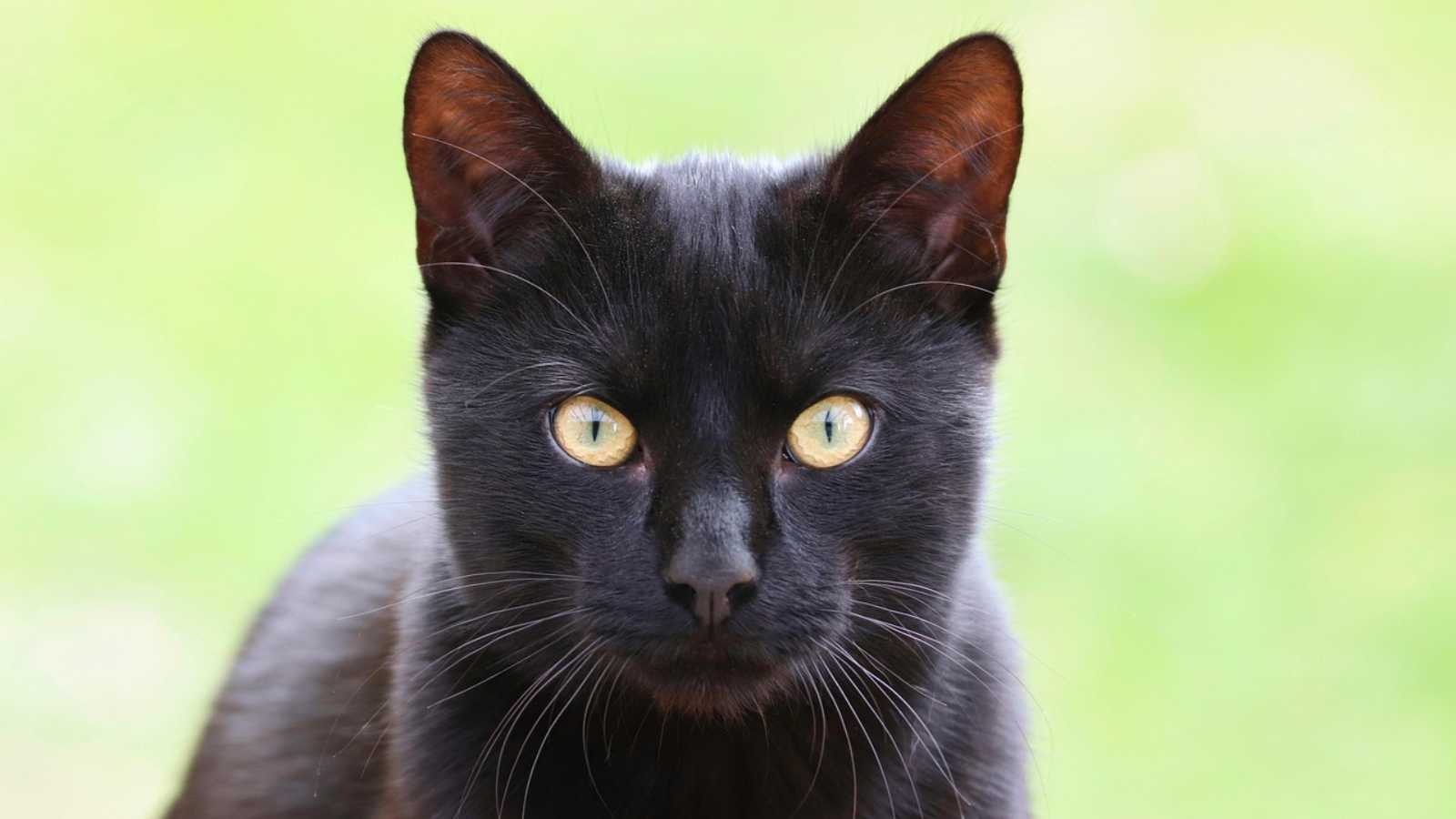This October 27, National Black Cat Day challenges centuries of superstition by celebrating one of the world’s most misunderstood—and most majestic—animals.
Every October 27, National Black Cat Day reminds us to look beyond superstition and see these beautiful animals for what they truly are: companions, cultural icons, and symbols of resilience. Few creatures inspire as much fascination, mystery, and misunderstanding as black cats. They have been feared, worshipped, adored, and demonized throughout history, often reflecting the hopes and fears of the societies that lived alongside them. Today the holiday offers a chance to celebrate their elegance and charm while also shedding light on the prejudice they continue to face.
The Long Shadow of Superstition
Black cats have walked beside humans for thousands of years, yet their story is not a simple one. In ancient Egypt, cats of all colors were revered, and black cats in particular were thought to bring good luck. The goddess Bastet, often depicted with the head of a lioness or a domestic cat, was associated with protection, fertility, and motherhood. To harm a cat was considered a crime, punishable by death, which shows just how much Egyptians valued these animals.
The reverence did not last forever. By the Middle Ages in Europe, black cats were swept into the tide of suspicion that surrounded witchcraft. Their dark coats and nocturnal habits made them convenient scapegoats in a world that feared the unknown. People believed witches kept black cats as familiars or that witches themselves could transform into cats. In some places, spotting one was considered an omen of death. These fears led to mass killings of cats, which ironically may have worsened the spread of the Black Plague as rat populations exploded without feline hunters to keep them in check.
A Tale of Two Beliefs

Superstitions about black cats diverge depending on where you look in the world. In much of Europe and the United States, black cats have been linked to bad luck, especially if one crosses your path.But in the United Kingdom and Japan, they are symbols of prosperity. In Japan, a single woman with a black cat was once thought to attract more suitors because the cat signified good fortune and love. In Scotland, a black cat appearing on your doorstep was considered a sign of coming wealth. Even today, sailors and fishermen in some cultures view black cats as lucky mascots, believing they protect ships and homes from harm.
This contrast highlights how cultural context shapes perception. The same animal can be seen as either a curse or a blessing depending on the society observing it.
The Hollywood Effect
In modern times, black cats have become staples of pop culture. Halloween decorations would feel incomplete without their arched silhouettes beside carved pumpkins and broomsticks. Movies and television have cemented their reputation as mysterious sidekicks. Think of Salem from Sabrina the Teenage Witch, Binx from Hocus Pocus, or even the Cheshire Cat’s darker cousins in various retellings. These portrayals keep the aura of magic alive but also reinforce the association with the supernatural.
At the same time, pop culture has provided some redemption. Social media has given rise to accounts dedicated to black cats, where owners proudly share their pets’ personalities and quirks. Hashtags like #BlackCatAppreciation and #AdoptABlackCat aim to dismantle old myths and show these felines as lovable and adoptable companions.
Challenges in Shelters
One of the saddest realities is that black cats are still less likely to be adopted from shelters than their lighter-colored counterparts. There are a few reasons behind this. Old superstitions still cast a shadow, leading some people to avoid them. In other cases, the problem is simply visibility. Black cats do not photograph as easily, making them less noticeable in adoption listings where pictures matter. Shelters often see them waiting longer for homes, despite being just as affectionate and playful as other cats.
National Black Cat Day was partly created to counter this bias. By highlighting their beauty and debunking the myths, advocates hope to give these cats a better chance at finding families who will cherish them.
What Science Says About Black Cats
Beyond folklore, science offers fascinating insights into black cats. Their coloring is caused by a genetic mutation that produces dense black pigment in their fur. Interestingly, the same mutation has been linked to resistance against certain diseases, including some that also affect humans. Researchers studying black cats have suggested that their genetics could provide clues to understanding HIV and other conditions. Far from being cursed, these cats may carry secrets of survival in their DNA.
Behaviorally, black cats are no different from any other cats. They can be shy or outgoing, calm or mischievous, depending on their individual personality. Yet many owners swear that black cats seem especially affectionate, perhaps because of the close bond that forms when people adopt animals who have been overlooked.
The Beauty of the Black Coat
One reason to celebrate National Black Cat Day is simply aesthetic. Their glossy coats shine in the light, ranging from sleek jet black to shades with hidden chocolate or auburn undertones. Their eyes, often golden or green, stand out brilliantly against their dark fur. This striking appearance has inspired artists, poets, and photographers for centuries. In folklore, the contrast between their luminous eyes and shadowy bodies was thought to symbolize the balance between seen and unseen worlds.
Stories From History
History is full of anecdotes about black cats both feared and adored. Cardinal Richelieu of France was famous for keeping several black cats in his palace, treating them almost like advisors. In England, King Charles I owned a black cat he considered lucky. On the very day the cat died, the king was arrested, leading his supporters to believe the animal’s protection had been lost. These stories reveal how much symbolic weight people have placed on black cats, turning them into living omens of fate.
A Day to Change Perception

National Black Cat Day is more than a quirky holiday. It is a chance to challenge old ideas and celebrate diversity even in the animal world. Just as people fight against stereotypes in human culture, advocates remind us that cats deserve to be judged by their personality, not their appearance. By sharing stories, photos, and adoption opportunities, cat lovers use the day to change minds and open hearts.
It is also a reminder to treat animals with compassion, especially those historically misunderstood. When we see black cats as unlucky or scary, we deny them the love and homes they deserve. National Black Cat Day turns that thinking upside down and encourages everyone to look with fresh eyes.
How to Celebrate
Celebrating can be as simple as posting a picture of your black cat with a loving caption or as meaningful as adopting one from a shelter. Some shelters hold special adoption events to mark the day, offering discounts or sharing success stories of families who welcomed black cats into their lives. You can also donate to animal rescue organizations or volunteer your time.
For those who already share their home with a black cat, October 27 is the perfect excuse to spoil them a little extra. A new toy, a soft blanket, or simply extra playtime shows appreciation. Sharing their story online can inspire others to see the beauty and joy these cats bring.
The Takeaway
Black cats embody mystery, history, and resilience. They have been revered as gods, condemned as demons, and adored as companions. National Black Cat Day is our chance to rewrite the story, reminding the world that these sleek, enchanting animals are not omens of bad luck but symbols of beauty, strength, and survival. Whether you believe in superstition or not, one thing is certain: a black cat crossing your path could be the beginning of a wonderful friendship.
15 cat myths most people still believe that are totally false

Cats are intricately connected with myths. Which one do you believe?






